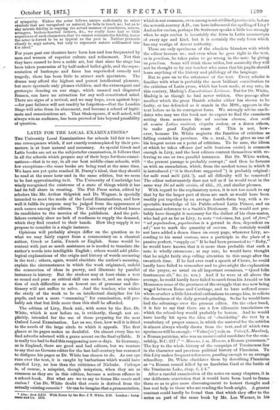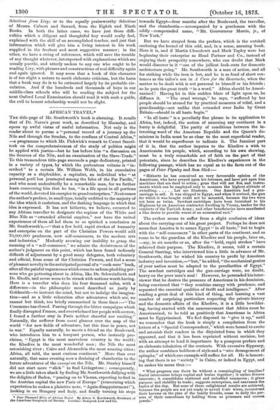LATIN FOR THE LOCAL EXAMINATIONS.* TEE University Local Examinations for
schools bid fair to have one consequence which, if not exactly contemplated by their pro- moters, is at least natural and necessary. As special Greek and Latin books are set as the subjects for examination, it follows that in all the schools which prepare any of their boys for these exami- nations—that is to say, in all our best middle-class schools, with few exceptions—the same books are being read at the same time. We have not yet quite reached M. Duruy's ideal, that they should be read at the same hour and in the same edition, but we seem to be fast approximating to it. The University of Cambridge has wisely recognised the existence of a state of things which it has had its full share in creating. The Pitt Press series, edited by scholars like Mr. Arthur Sidgwick and Dr. Wagner, is specially intended to meet the needs of the Local Examinations, and how well it fulfils its purpose may be judged from the appearance of such names among its editors. The University of Oxford leaves its candidates to the mercies of the publishers. And the pub- lishers certainly show no lack of readiness to supply the demand, which they find created to their hands. How they supply it we propose to consider in a single instance.
Opinions will probably always differ on the question as to what we may fairly expect from a commentary on a classical author, Greek or Latin, French or English. Some would be content with just so much assistance as is needed to translate the author's words into intelligible English ; others would add philo- logical explanations of the origin and history of words occurring in the text ; others, again, would elucidate the author's meaning, explain the circumstances in which the work originated, unfold the connection of ideas in poetry, and illustrate by parallel instances in history. But the student may at least claim a text as sound and pure as critical skill can make it, and an explana- tion of such difficulties as an honest use of grammar and dic- tionary will not suffice to solve. And the teacher, who wishes the study of the work to be an intellectual discipline for his pupils, and not a mere " cramming " for examination, will pro- bably ask that but little more than this shall be afforded.
The edition of Livy, Book xxii., with notes by the Rev. Dr. White, which is now before us, is evidently, though not ex- plicitly, intended for the use of those preparing for the next Oxford Local Examination. Let us see, then, how well it is fitted to the needs of the large circle to which it appeals. The first glance at its pages makes us doubtful. On almost every line we find adverbs adorned with a grave accent on the final syllable. It is really too bad to find this reappearing now-a-days. In Germany, as in England, there are good and bad editors, but we venture to say that no German editor for the last half-century has ventured to disfigure his pages as Dr. White has chosen to do. As our eye runs over the text, it is caught by barbarisms which would have startled Livy, no less than the criticisms of Niebuhr. Colleagn is, of course, a misprint, though misprints, when they are as common as they are in this edition, become a serious offence in a school-book. But what are we to say to forms like condo and coelumt Can Dr. White doubt that contio is derived from the actually existing cove-tido ? Or can he imagine that a pronunciation,
• Lin: Book 2E111. With Notes by the Rev. J. T. White, D.D. London : Long- mans and Co. ltin.
which is not common, even among semi-civilised provincials, before the seventh century A.D., can have influenced the spelling of Livy?
And as for coelum, perhaps Dr. Scrivener speaks a little too strongly when he says caelum is invariably the form in Latin manuscripts. of every age and kind, but it is certainly the only form which has any vestige of decent authority.
These are only specimens of the obsolete blunders with which the editor favours us ; and even when he goes right in the text, as in proelium, he takes pains to go wrong in the note by giving- us praelium. Some will think these trifles, but assuredly they will not be thought so by any teacher who cares that his pupils should learn anything of the history and philology of the language.
But to pass on to the substance of the text. Every scholar is.
familiar with what is probably the most brilliant contribution to the criticism of Latin prose, which has been made, at any rate, in
this century, Madvig's Emendationes Livianae. But for Dr. White, Madvig is as though he had never written. One passage after another which the great Danish scholar either has shown to be faulty, or has defended as it stands in the MSS., appears in the text before us in its corruptest form. We strongly advise candi- dates who may use this book not to expect to find the examiners setting them sentences like ad 'lad= classes, dam socii ab nomine Latino venirent, virgulta ardere, or a dozen others, to make good English sense of. This is not, how- ever, because Dr. White neglects the function of criticism as. falling outside his province. On c. xxxi., 3, he gives us one of his longest notes on a point of criticism. To be sure, the idiom at which he takes offence (ad mille hominum occiso) is common enough in Livy, and the best editors content themselves with re- ferring to one or two parallel instances. But Dr. White writes, " the present passage is probably corrupt ;" and then he favours• us with an emendation, which, from the modest terms in which it is introduced (" it is therefore suggested ") is probably original for mille read milli (abl. I), and all difficulty will be removed t The editor unfortunately does not tell us if he would treat in the same way lbi ad milk occisis, of xliii., 23, and similar phrases.
With regard to the explanatory notes, it is not too much to say that by far the larger part of them are such as would have been readily put together by an average fourth-form boy, with a re- spectable knowledge of his Public-school Latin Primer, and an occasional reference to a Smith's Dictionary. He would not pro- bably have thought it necessary for the dullest of his class-mates,
who had got as far as Livy, to note "hderimus, fut. perf. of faro ;11. " ad populandum, populandum is a gerund in dum, dependent on
ad;" nor to mark the quantity of suarum. He certainly would not have added a dozen times on every page, wherever Livy, ac- cording to his usual custom, uses a participle in the place of a passive perfect, "supply est." If he had been promoted to " Roby," he would have known that it is more than probable that such a note is wholly erroneous ; at any rate, he would have thought that he might fairly stop calling attention to this usage after the twentieth time. If he had ever read a speech of Cicero, he could hardly have failed to remember and to give aright the explanation of the prayer, so usual on all important occasions, " Quod felix faustumque sit," &c. (c. xxx.) And if he were at all above the average, he could hardly have failed to catch from his Arnold or his Mommsen some of the greatness of the struggle that was now being waged between Rome and Carthage, and to have suffered some- where or other a little historical enthusiasm to escape him, to relieve the dreariness of the daily gerund-grinding. So far he would have had the advantage over the present editor. On the other band, it is fair to say that there are a few idiomatic translations on which the school-boy would probably be beaten. And he would have hardly hit upon the idea of elucidating' the text by a vocabulary of proper names, in which the material for the articles is almost always wholly drawn from the text, and of which two specimens will be enough : " Vulso [sic] anis, m. Vulso (L. Manlius), a Roman patrician, who was an unsuccessful candidate for the con- sulship, B.C. 217 ;" " Mancus, i. m. Mancus, a Roman prmnomen."
The key to the whole history of the campaign of Trasimenus lies in the character and previous political history of Flaminius. To this Livy makes frequent references, puzzling enough to an average schoolboy. Dr. White elucidates these by describing Flaminius. as "a Roman consul killed by an Insubrian Gaul at the battle of the Trasimene Lake, chap. 6, § 4."
After a careful examination of the notes on many chapters, it is our deliberate conviction that it would have been hard to frame them so as to give more discouragement to honest thought and less real help to those who are reading the book aright. A greater contrast could hardly be found than that which they offer to the notes on part of the same book by Mr. Lee Warner, in his
Selections from Livy; or to the equally praiseworthy Selections of Messrs. Calvert and Saward, from the Eighth and Ninth Books. In both the latter cases, we have just those diffi- culties which a diligent and thoughtful boy would really feel, explained with the skill of an accomplished teacher, and just that information which will give him a living interest in his work supplied in the freshest and most suggestive manner ; in the other, we have a string of references, which will save the trouble of any thought whatever, interspersed with explanations which are usually puerile, and utterly useless to any one who ought to be reading Livy, with phrases and constructions of real difficulty again and again ignored. It may seem that a book of this character is of too slight a nature to merit elaborate criticism, but the harm that a book may do is to be estimated largely by its probable cir- culation. And if the hundreds and thousands of boys in our middle-class schools who will be reading the subject for the next Oxford Local Examination should read it with such a guide, the evil to honest scholarship would not be slight.



































 Previous page
Previous page